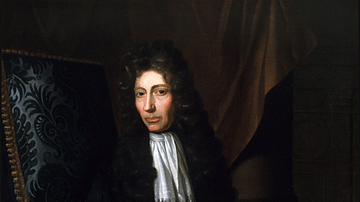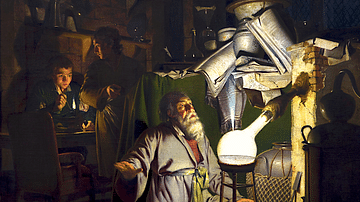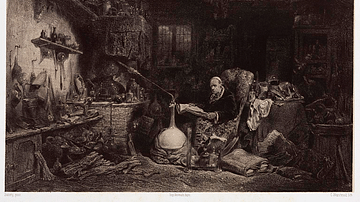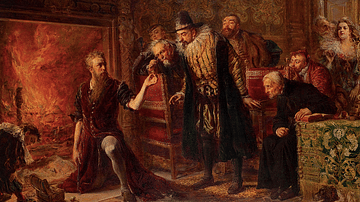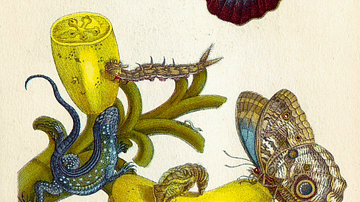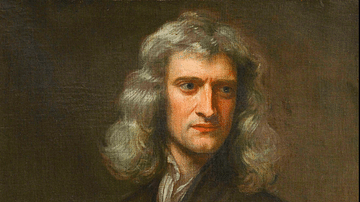
Alchemy is an ancient practice aimed at recreating precious substances using recipes and transformative materials such as the philosopher's stone. Alchemists believed that materials like gold, silver, gems, and purple dye could be recreated if the right combination of ingredients and transformative methods were found. Other avenues of exploration in later centuries were aimed at increasing the potency of medicines, finding an elixir that prolonged life, and even achieving the redemption of the soul.
Alchemy interested thinkers and practitioners from many ancient cultures as it posed questions relevant to natural philosophy such as: How do things come into being? What are things made of? Can some things be transformed into other things? The essential idea of alchemy is the answer to the third question is yes. The trick, then, is to find the answer to the first two questions and so discover the recipes and apparatus necessary to create much-sought-after precious substances like gold, always admired for its incorruptibility. Alchemists believed they could remove impurities from a substance and so make another substance entirely. Conversely, they could mix substances and create a new substance with entirely different properties. As it was believed nature did this anyway, the real search for alchemists was to find a way to replicate the natural transformation of substances and even speed it up using some sort of catalyst. This fabled facilitator became known as the philosopher's stone.
Alchemy really took off in Greco-Roman Egypt from the 1st to 7th century CE and was continued by practitioners in the Byzantine Empire and the Arab world. There was some cross-cultural exchange of ideas; the notion of an elixir of life, for example, "appears to have first entered the Islamic world from China, eventually passing to the West" (Burns, 12). As many ancient texts were lost during the Middle Ages, it was not until the Renaissance and Scientific Revolution – the 15th century onwards – that alchemy came under further serious investigation, although Islamic alchemy texts translated into Latin began to filter through the Western knowledge network via North Africa, Spain, and Sicily from the mid-12th century. In the following centuries, many Byzantine texts concerning alchemy also made their way to Europe, this time via Italy.
The history of alchemy is often as obscure as the secrets the alchemists wished to discover, secrets they firmly believed could be found through the careful study of ancient texts. To investigate the subject of alchemy is really to trace the origins of modern chemistry (some historians even prefer the word 'chymistry' to alchemy). The objectives of alchemy interested some of the greatest minds in history and led to them inquiring into the nature of the true properties that make up our material world.

Ancient Alchemy: Origins & Sources
Ancient sources on alchemy are fragmentary and far from reliable in all instances. One of the oldest surviving texts on Greek and Latin alchemy dates to the 3rd or 4th century CE and is made up of two parts: Papyrus X from Leiden and the Stockholm Papyrus. These documents contain recipes from much older sources for such precious substances as gold, silver, gemstones, and Tyrian purple. One of the ancient authors frequently cited is the 5th-century BCE philosopher and traveller Democritus (c. 460 to c. 370 BCE). Another source, this time from the 11th century CE but obviously a copy of probably a 7th-century CE text, was likely made in Constantinople. This source, Corpus M, has a table of contents and is a compilation of earlier sources. Corpus M appears in part in a 13th-century collection of material of unknown origin known as Corpus B. Other medieval sources such as Corpus AL include parts of these sources and sometimes additional material inserted, often with an unknown provenance. All of these documents (and later ones) suffer from the problem that copyists were not always faithful to the original texts they worked with. Frequently, there are dubious corrections and additions, but also symbols and vocabulary which remain obscure, something later alchemists took as proof that secrets were written in them if only one could interpret this odd language correctly.
Several medieval treatises deal with alchemy and quote parts of those sources already mentioned. There is, too, an additional group of texts which come from translations made in antiquity of Greek texts into Syriac and Arabic. Most other sources on alchemy date from the 16th and 17th centuries when there was a great revival in interest in the ancient alchemists.
Most ancient sources on alchemy credit Democritus as being the first great alchemist, or rather the first to document the activity of alchemy in any detail. A fragmentary text Physika kai mystika (aka Natural and Initiatory Matters) was recognised by later alchemists as being the earliest text on the subject, and they (erroneously) credited it to Democritus. Modern scholars refer to the author (or authors) as a pseudo-Democritus. The text dates to perhaps the 1st century CE and recounts failed experiments conducted in a temple in Memphis to achieve the aims of alchemy.
The real Democritus was a good figure for alchemists to latch onto because he believed that the physical world is made up of tiny particles called atomos. Different substances are made up of different combinations of atomos. By extension, one could, therefore, make a substance like gold if only one knew the right combination of atomos. Transmutation was merely a reshuffling of known substances. This idea combined well with the ancient notion of mimēsis, that is, the belief that humanity's craftsmanship and knowledge could imitate anything nature was capable of producing. In addition, as alchemy seemed extremely difficult, perhaps almost impossible, a leap of faith was required in the practitioner, in other words, some sort of magic might be required. It is significant that the ancient Greeks did not use the term alchemy or chemeia with any great frequency and preferred to call this mysterious endeavour a 'holy science' or 'divine art'. Alchemy did have something of the divine about it. Could humans really recreate, change, or even better the work of the original Creator? This last belief often meant alchemists were at odds with religious institutions. The Latin alchimia does not appear in texts until the 12th century CE and has its roots in Arabic.
Other Greek thinkers associated with alchemy include Plato (c. 424-347 BCE) and Aristotle (384-322 BCE), but the attachment of these great names to alchemy is likely more indicative of the once generally-held belief that any great thinker should know about alchemy rather than any factual evidence that they could indeed create precious materials from non-precious ones.
Alchemy grabbed the imagination of thinkers in other cultures besides ancient Greece. Ancient Egyptian, Mesopotamian, Jewish, and Chinese Taoist scholars all investigated the subject. Specific ancient figures credited with knowledge of alchemy include the Persian magus Ostanes (a tutor of Democritus), Pammenes, Pibechius (possibly an Egyptian), Mary the Jewess (illustrating that women were involved in alchemy from an early date), Comarius, and the Egyptian Zosimus of Panopolis who was active around 300 CE and who added a mystical quest to find spiritual perfection at the same time as discovering perfection and purity in certain materials. That the pursuit of alchemy was relatively widespread and taken seriously is evidenced by the fact that Roman Emperor Diocletian (r. 284-305 CE) ordered the destruction of Egyptian texts on the subject as insurance against the province becoming too wealthy and so too rebellious.
Alchemy may seem far-fetched today, but it was not always so considered, and with good reason. There were ancient artisans capable of creating materials that looked like but were not actually gold, silver, precious stones, and purple, notably in Hellenistic and Roman Egypt. Oxidation and reduction in ancient pottery kilns, dyeing textiles using plant or animal materials, and enriching certain metals to make them stronger or creating alloys in the blacksmith's furnace were all processes where humanity literally changed nature. In addition, Mother Nature herself was transforming materials from one form to another all the time such as ice melting to water, wood burning to ashes, liquid evaporating into vapour, or the solidification of volcanic lava. Nature has some wonderful transformative substances that can easily be observed by anyone. An example is alcohol, which has a strange effect on the body when consumed in large enough quantities. Alcohol evaporates quickly, it can dissolve some matter like resin, but, in contrast, it can also be used to preserve other organic matter, and it can even be burnt.
True alchemy and an imitation or even control of nature seemed only a tantalising step away from the achievements of the skilled craftsperson. By following Aristotle's principles (and most alchemists did) that there are four elements of earth, fire, air, and water, the next step was to find a way to make one's own combinations of these elements and so create any material that one wished. This was considered an entirely possible next step since most alchemists were spurred on by the belief that ancient alchemists had already been successful in turning base metals into gold but the secret had been lost. Studying old texts and conducting endless experiments would surely retrieve this lost knowledge, they thought.
Alchemy's Recipes & Equipment
Ancient alchemists had a two-pronged strategy to transform ordinary substances into precious materials. The first was to remove what were considered certain 'characteristics' or 'impurities', say of a particular metal, in order to leave behind a purer version. The second was to combine different substances to create a new material, or at least a new coloured version in a sort of chemical cookery exercise. Alchemists used all manner of ingredients in their recipes, but sulphur, salt, soda, lead, and mercury were favourites, the former for their association with ancient practices like mummification, and the latter two because of their liquid properties. Their equipment included crucibles in which substances were heated, miniature furnaces, glass tubes and beakers, and apparatus for distillation. In effect, then, the workbenches of the alchemists were the first chemical laboratories. There was, though, very often a mystical element to the proceedings. Many alchemists not only believed that the right combination of substances had to be achieved but that experiments also had to be conducted at particular times. Horoscopes, spells, and incantations could all be part of the alchemist's armoury of knowledge.
In the Light of the Renaissance & Science
With the loss of ancient texts until their reintroduction and discovery during the Renaissance, alchemy seemingly disappears from view for many centuries. The early modern interest in experimentation and scientific inquiry, which led to the Scientific Revolution (1500-1700) resulted in a revival in the study of alchemy. Alchemists still attempted to make gold from base metals like lead by using a substance they called the philosopher's stone, which was often represented in their diagrams by a phoenix. Apart from usually being considered a powder, there was no consensus on what the philosopher's stone was made of, some preferred to include mercury with a dash of pure gold in the mix (often called by alchemists incalescent or philosophical mercury), others plain old salt. Rulers were particularly keen to get their hands on the philosopher's stone and increase both their wealth and power, so much so that many alchemists found employment at one court or another where their research received vital financial backing. Alchemy also branched out into new areas such as medicine where it was believed specially prepared substances could enhance known medicines.
Another new avenue of alchemy developed in this period, which saw thinkers take the tenets of alchemy as an allegory for purely philosophical inquiry. The alchemists themselves increasingly used allegorical and metaphorical language for their investigations and ingredients. Common vocabulary appears such as 'marriage', 'birth', and 'death' to describe alchemic processes. The triad of substances so loved by alchemists – mercury (which represented volatility), sulphur (combustibility), and salt (stability) – were even equated with the Holy Trinity of Christianity. Alchemy came to be seen as a method to achieve salvation of the soul. Instead of finding long-searched-for solutions, alchemy seemed to be getting wackier and more ambitious, but the crucibles were still not glittering with gold.
The alchemists tended to become much more secretive about their work, corresponding perhaps to the rising prominence of reason and the evidence-based scientific inquiry of the Scientific Revolution. The alchemists themselves, rather dubiously, claimed their secrecy was necessary since, in the wrong hands, their methods might result in too much gold being produced and the world economy collapsing. There were some exceptions to the secretive approach, such as the Germanic alchemist who called himself Paracelsus (1493-1541), who wanted to make alchemy's secrets known to everyone. Significantly, the general secretiveness was directly opposed to the openness of science and the free exchange of information between scholars, one of the hallmarks of both the Renaissance and the Scientific Revolution. Alchemists, by restricting their knowledge to their private laboratories, were in real danger of finding themselves lost and forgotten by more mainstream and collaborative scholars.
Another weakness of the alchemists was their general lack of method; what was important to them was the result of an experiment. The new science of the early modern period, as proposed by such influential figures as Francis Bacon (1561-1626), was much more focussed on precise and systematic methods and factual observation, using accurate instruments like the telescope and microscope amongst many others, leaving behind the magic, mystic, esoteric, and haphazard experiments of the alchemists, who were, after all, still singularly unsuccessful in their endeavours. While alchemy's long tradition of practical experimentation was admired by scientists, they also noted a significant weakness. Unlike alchemists, scientists should, according to Bacon and others, approach their experiments without any theoretical bias as to what the eventual results of those experiments might be. Further, scientific inquiry now required the details of experiments to be openly communicated and tested by independent, and above all, critical colleagues in that particular field.
Alchemy became increasingly associated with low magic, which was, in turn, associated with the Devil. Many alchemists were exposed as frauds (usually caught trying to sell as gold what was not gold). Those alchemists who believed that even a human could be made if only the right substances were put together were ridiculed. The whole pseudoscience became ripe for satire, such as in The Alchemist, a 1610 play by Ben Jonson (c. 1572 to c. 1637). Alchemy had metamorphosed from an endeavour with awe-inspiring possibilities to a rather silly niche hobby.

Despite the progress of thought, alchemy did still capture the imagination of some intellectuals right through the early modern period, and important works continued to be published on the subject, such as Theatrum Chemicum and Theatrum Chemicum Britannicum in the mid-17th century. Both men and women continued to practice alchemy; one female alchemist with 30 years of experience was Isabella Cortese, an Italian who wrote The Secrets of Lady Isabella Cortese in 1561.
While alchemy's efforts to understand and control the elements appealed to some scientists, this most ancient of activities also appealed to some Christians who equated the death and resurrection of Jesus Christ as a transformative process that was echoed in certain physical matter.
Alchemy was not quite dead yet if it could only nourish the roots of the knowledge tree of science. Some of the period's most eminent scientists conducted extensive experiments in alchemy, notably Robert Boyle (1627-1691) and Isaac Newton (1642-1727). But theirs was a careful inquiry into the possibilities of alchemy and how it might help their studies in other areas such as astronomy, medicine, physics, and chemistry. It is telling that as alchemy buckled under the weight of the ever-growing number of findings of proper scientific inquiry, some practitioners preferred to use a pseudonym when writing on the subject, such as George Starkey (1627-1665), who sometimes used the name Eirenaeus Philalethes (which translates as "peaceful lover of truth"). As the historian D. Wootton notes, alchemy "had become entirely disreputable by the 1720s" (355).
Through the 18th century, alchemy continued to be practised in Central Europe in particular and to take on a symbolic significance in areas such as freemasonry when it rose in popularity. But alchemy's days were numbered as scholars and scientists made new discoveries in the late 18th century, such as the intransmutable elements (which later became our periodic table) that destroyed the foundation of alchemy. Scientists now looked to the future and technology, rather than focussing on the past and ancient texts to test their hypotheses on the world around us.
Today, toying in a laboratory with the protons, neutrons, and electrons of atoms, such as in modern nuclear physics to create nuclear fission, creating wonder materials like carbon fibre with its tremendous strength but great lightness, or growing to order unflawed sparkling diamonds would no doubt all have astounded the ancient alchemists but also perhaps have been taken as welcome evidence that they had not been far off-track in following the essential ancient principle that all matter is composed of basic building blocks. Perhaps, then, it is alchemy itself that has proved to be the philosopher's stone, the key that ultimately transformed natural philosophy into modern science.



